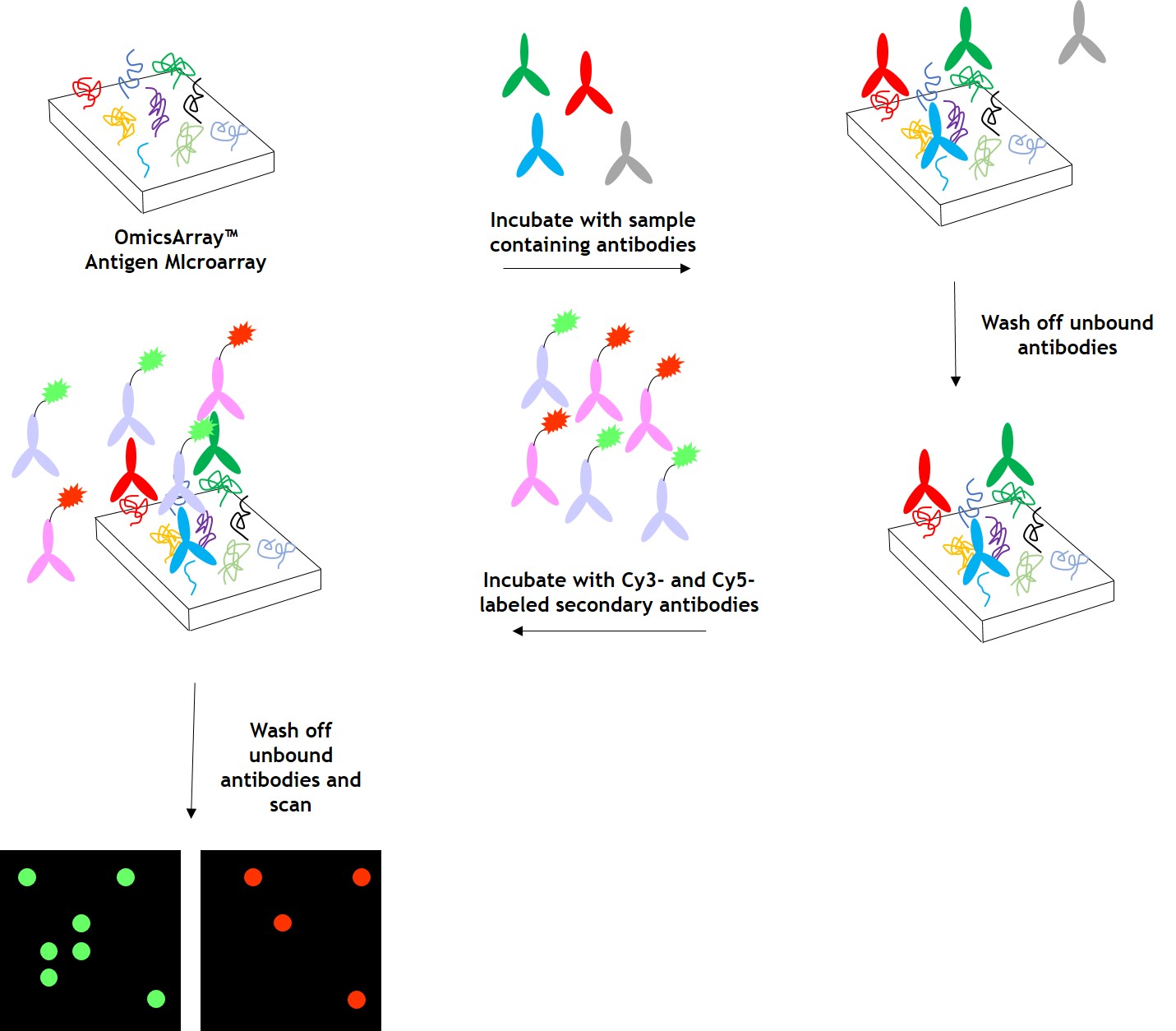Autoantibodies have been found in Alzheimer’s disease (AD) and may play a role in its development and progression. While not traditionally considered an autoimmune disease, AD exhibits evidence of immune system dysregulation and autoantibody generation. Numerous studies have identified autoantibodies in AD patients, with some showing up more consistently than others, such as those against amyloid-beta (Aβ) and tau proteins. These autoantibodies can either have a protective effect by clearing harmful protein aggregates or exacerbate the disease through inflammation and neuronal damage. Some autoantibodies are being investigated as potential biomarkers for early diagnosis or to track disease progression. Comprehensive profiling of these autoantibodies is crucial for understanding the potential mechanisms of the disease and developing better diagnostic tools and therapeutic strategies for AD.
GeneCopoeia’s OmicsArray™ Alzheimer’s Disease Autoantigen Array is a highly sensitive protein microarray that contains the largest collection of AD-associated antigens and offers powerful antibody profiling capabilities to detect autoantibodies that are associated with Alzheimer’s Disease. There are two versions of Alzheimer’s Disease Autoantigen Arrays: PA023-V1 contains 20 antigens and PA023-V2 contains 40 antigens.The 40 antigens included in the Alzheimer’s Disease antigen array panel were chosen based on a comprehensive review of published studies. The superior-quality purified antigens were coated onto the 3D surface of microchips to ensure that the antigens retain their natural conformations. Internal Ig and anti-Ig controls are included in each array for normalization and quantification purposes. Additionally, the utilization of fluorescent 2nd antibodies in our microarrays allows for the detection of two types (IgG, IgM, or IgA) of antibodies on the same array, minimizing the requirement of sample needed.
Reference:
- Autoantibodies in Alzheimer’s disease: potential biomarkers, pathogenic roles, and therapeutic implications. J Biomed Res. 2016;30(5):361-372.
- Autoantibodies in Alzheimer’s disease: Multifaceted roles and therapeutic horizons. J Alzheimer’s Dis. 2025 Jun 22:13872877251350292
- A cerebrospinal fluid synaptic protein biomarker for prediction of cognitive resilience versus decline in Alzheimer’s disease. Nature Medicine 2025; 31: 1592–1603
- Putative autoantibodies in the cerebrospinal fluid of Alzheimer’s disease patients. F1000Research 2019, 8:1900
- A combination of multiple autoantibodies is associated with the risk of Alzheimer’s disease and cognitive impairment. Scientific Reports 2022; 12:1312
- Specific serum autoantibodies predict the development and progression of Alzheimer’s disease with high accuracy. Brain, Behavior, and Immunity 115 (2024) 543–554
- The role of autoantibodies in Alzheimer’s disease: Pathogenetic connections or epiphenomena? Alzheimers Dement. 2025;21(7):e70484.
In addition to premade arrays, arrays containing customized sets of antigens are available, as well as array processing kits, array profiling services and data analysis. To order premade or custom arrays, please contact us.
GeneCopoeia’s OmicsArray™ Alzheimer’s Diseases Autoantigen Array is part of the GeneCopoeia OmicsArray™ Antigen Microarray family.
Premade Antigen Arrays
The listed chip prices apply to academic customers. For custom arrays and services pricing, please contact us.
*There are two versions of Alzheimer’s Disease Autoantigen Arrays: PA023-V1 contains 20 antigens and PA023-V2 contains 40 antigens.
Prices are for customers from the U.S. and Canada only. For other customers, please contact your local distributor for details.
Antigen microarray processing kits and accessories
Prices are for customers from the U.S. and Canada only. For other customers, please contact your local distributor for details.
Custom services
GeneCopoeia offers custom antigen microarray services in the following areas:- Custom array printing. GeneCopoeia will create custom antigen microarrays built to your specifications.
- Sample processing. Send us your blood, plasma, tissue, or other biological sample and we will prepare it for processing and incubation with any of our premade antigen microarrays or custom-built antigen microarrays for autoantibody profiling and other applications. For information on sample types to submit, consult the FAQ
- Data analysis. Once samples are processed and incubated with an antigen microarray, we will analyze the raw data. The standard analysis service includes: 1) An Excel file of the Net Signal Intensity (NSI) for each antigen on the array, normalized to internal controls; and 2) a heat map

